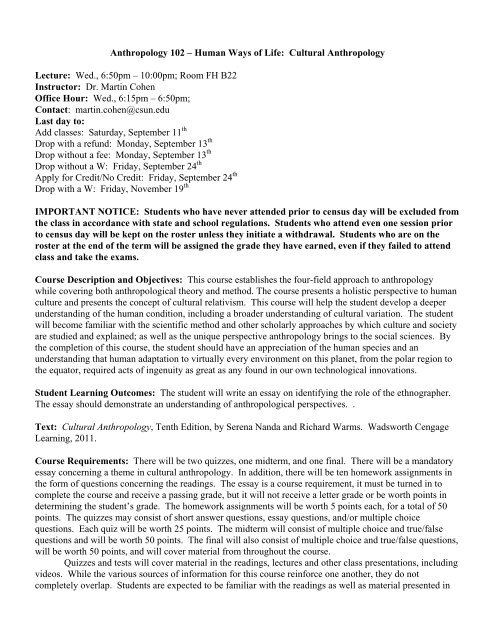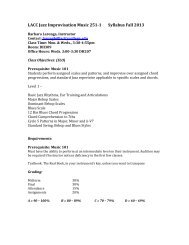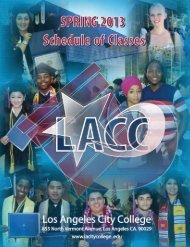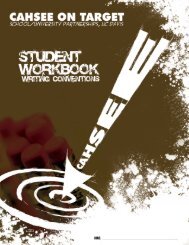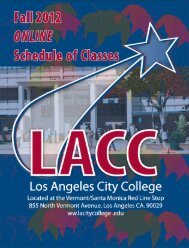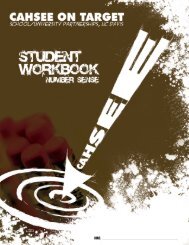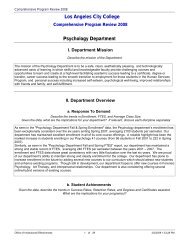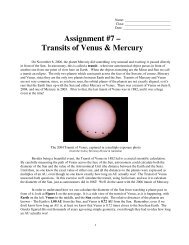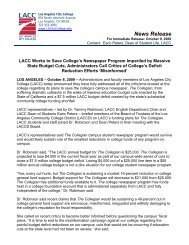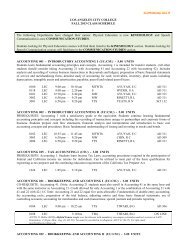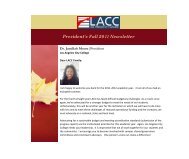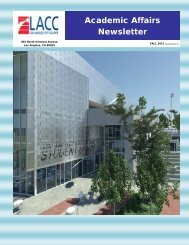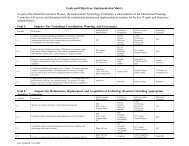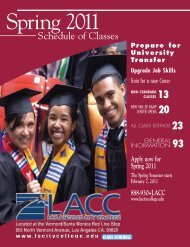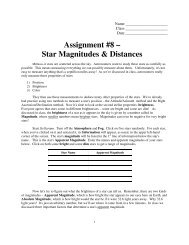Anthropology 102 – Human Ways of Life: Cultural Anthropology ...
Anthropology 102 – Human Ways of Life: Cultural Anthropology ...
Anthropology 102 – Human Ways of Life: Cultural Anthropology ...
Create successful ePaper yourself
Turn your PDF publications into a flip-book with our unique Google optimized e-Paper software.
<strong>Anthropology</strong> <strong>102</strong> <strong>–</strong> <strong>Human</strong> <strong>Ways</strong> <strong>of</strong> <strong>Life</strong>: <strong>Cultural</strong> <strong>Anthropology</strong><br />
Lecture: Wed., 6:50pm <strong>–</strong> 10:00pm; Room FH B22<br />
Instructor: Dr. Martin Cohen<br />
Office Hour: Wed., 6:15pm <strong>–</strong> 6:50pm;<br />
Contact: martin.cohen@csun.edu<br />
Last day to:<br />
Add classes: Saturday, September 11 th<br />
Drop with a refund: Monday, September 13 th<br />
Drop without a fee: Monday, September 13 th<br />
Drop without a W: Friday, September 24 th<br />
Apply for Credit/No Credit: Friday, September 24 th<br />
Drop with a W: Friday, November 19 th<br />
IMPORTANT NOTICE: Students who have never attended prior to census day will be excluded from<br />
the class in accordance with state and school regulations. Students who attend even one session prior<br />
to census day will be kept on the roster unless they initiate a withdrawal. Students who are on the<br />
roster at the end <strong>of</strong> the term will be assigned the grade they have earned, even if they failed to attend<br />
class and take the exams.<br />
Course Description and Objectives: This course establishes the four-field approach to anthropology<br />
while covering both anthropological theory and method. The course presents a holistic perspective to human<br />
culture and presents the concept <strong>of</strong> cultural relativism. This course will help the student develop a deeper<br />
understanding <strong>of</strong> the human condition, including a broader understanding <strong>of</strong> cultural variation. The student<br />
will become familiar with the scientific method and other scholarly approaches by which culture and society<br />
are studied and explained; as well as the unique perspective anthropology brings to the social sciences. By<br />
the completion <strong>of</strong> this course, the student should have an appreciation <strong>of</strong> the human species and an<br />
understanding that human adaptation to virtually every environment on this planet, from the polar region to<br />
the equator, required acts <strong>of</strong> ingenuity as great as any found in our own technological innovations.<br />
Student Learning Outcomes: The student will write an essay on identifying the role <strong>of</strong> the ethnographer.<br />
The essay should demonstrate an understanding <strong>of</strong> anthropological perspectives. .<br />
Text: <strong>Cultural</strong> <strong>Anthropology</strong>, Tenth Edition, by Serena Nanda and Richard Warms. Wadsworth Cengage<br />
Learning, 2011.<br />
Course Requirements: There will be two quizzes, one midterm, and one final. There will be a mandatory<br />
essay concerning a theme in cultural anthropology. In addition, there will be ten homework assignments in<br />
the form <strong>of</strong> questions concerning the readings. The essay is a course requirement, it must be turned in to<br />
complete the course and receive a passing grade, but it will not receive a letter grade or be worth points in<br />
determining the student’s grade. The homework assignments will be worth 5 points each, for a total <strong>of</strong> 50<br />
points. The quizzes may consist <strong>of</strong> short answer questions, essay questions, and/or multiple choice<br />
questions. Each quiz will be worth 25 points. The midterm will consist <strong>of</strong> multiple choice and true/false<br />
questions and will be worth 50 points. The final will also consist <strong>of</strong> multiple choice and true/false questions,<br />
will be worth 50 points, and will cover material from throughout the course.<br />
Quizzes and tests will cover material in the readings, lectures and other class presentations, including<br />
videos. While the various sources <strong>of</strong> information for this course reinforce one another, they do not<br />
completely overlap. Students are expected to be familiar with the readings as well as material presented in
class; attending class without reading the text, or reading the text without attending class will not sufficiently<br />
prepare the student for the quizzes or exams.<br />
Grading: There are 200 points possible. Grading will breakdown as follows: A <strong>–</strong> 180 to 200 points; B <strong>–</strong><br />
160 to 179 points; C <strong>–</strong> 136 to 159 points; D <strong>–</strong> 116 to 135 points; anything lower than 116 points will be an F.<br />
Extra Credit and Attendance: The best assurance <strong>of</strong> a passing grade is to study hard and be prepared for<br />
the tests. Extra credit assignments tend to distract from this primary task. The ONLY source <strong>of</strong> extra credit<br />
will be 10 bonus points. Each student will start out with 10 bonus points. Beginning the second week <strong>of</strong><br />
instruction, one absence will cost the student five bonus points. Two absences will cost the student all <strong>of</strong><br />
his/her bonus points. There will be no other source <strong>of</strong> bonus points. An “absence” is defined as not being<br />
present when the instructor takes role. Being present during a portion <strong>of</strong> the class, but not at the time role is<br />
taken will count as an absence. Role will be taken when the instructor deems it convenient to do so.<br />
It is doubtful that one may earn a grade higher than a “C” if one misses five or more class meetings. It is<br />
doubtful that one may earn a passing grade if one misses eight to ten class meetings. The instructor will<br />
make himself as available as possible after class for students who need help. Students who seek special<br />
consideration in terms <strong>of</strong> extra credit, an exception made for a particular exam or quiz response, credit for an<br />
out <strong>of</strong> class activity, or any other exceptional consideration will be directed back to the above paragraph.<br />
These bonus points may be precious, once they are gone, there is no way to get them back.<br />
Incompletes: Except for extraordinary emergency situations, the student is better <strong>of</strong>f taking a withdrawal<br />
than an incomplete. The Instructor will ONLY grand incompletes to students missing no more than one<br />
assignment. Students who are missing more than one assignment that has not been made up by the time <strong>of</strong><br />
the final will receive the grade earned by their total points.<br />
Classroom Rules: 1. Students are requested to turn cell phones <strong>of</strong>f during class and KEEP THEM OUT OF<br />
SIGHT. Students will neither receive nor make phone calls during class time (you will be reminded by the<br />
instructor’s angry glare every time your phone sounds or appears on your desk). 2. Students are expected to<br />
attend class regularly. 3. Students are expected to come to class on time. Late arrivals are disruptive <strong>–</strong> if<br />
this becomes a problem during the semester, students arriving late will not be admitted to class. 4. Any<br />
chatting, note-passing, loud eating or other behaviors that disturb and distract other students or the instructor<br />
are prohibited. 5. Students should leave the room only when absolutely necessary. Frequent exiting and<br />
entering during class time will result in restrictions.<br />
Academic Honesty: There is no place in the college environment for cheating or plagiarism. All incidents<br />
<strong>of</strong> dishonesty will require a response in accordance with school policy. Plagiarism consists <strong>of</strong> the use <strong>of</strong><br />
printed, published, or on-line information without proper citation <strong>of</strong> source, as well as direct, word for word<br />
copying without quotation marks and proper citation. Any plagiarized assignment will receive 0 points, with<br />
no appeal.<br />
Course Outline:<br />
WEEK 1 September 1 st<br />
Introduction to Course and <strong>Anthropology</strong>. Reading: Chapter 1.<br />
WEEK 2 September 8 th<br />
Topic: <strong>Human</strong> Diversity, <strong>Human</strong> Evolution; Studying People. Readings: Chapters 2 and 3Video: Faces <strong>of</strong><br />
Culture #3: How Cultures are Studied<br />
2
WEEK 3 September 15 th<br />
Topics: Topics: Studying People (cont.); The Concept <strong>of</strong> Culture. Reading: Chapter 4.<br />
WEEK 4 September 22 nd<br />
Topics: Language and Culture, Acquiring Culture. Readings: Chapters 5. Video: American Tongues<br />
WEEK 5 September 29 th -<br />
Topic: Language (cont.) Subsistence Technologies. Reading: Chapter 6.<br />
WEEK 6 October 6 th Quiz 1<br />
Topic: Subsistence (cont.); Economic Organization. Reading: Chapter 7.<br />
WEEK 7 October 13 th<br />
Topic: Social Organization: Marriage, Family, and Domestic Groups. Reading: Chapter 8.<br />
WEEK 8 October 20 th - Midterm<br />
Topic: Social Organization: Kinship. Reading: Chapter 9. Fourth Homework Assignment Due.<br />
WEEK 9 October 27 th<br />
Topics: Kinship (cont.); Sex, Gender, and Culture. Reading: Chapter 10.<br />
WEEK 10 November 3 rd<br />
Topics: Sex (cont.); Political Organization. Reading: Chapter 11.<br />
WEEK 11 November 10 th - Quiz 2<br />
Topics: Politics; Social Stratification. Reading: Chapter 12<br />
WEEK 12 November 17 th<br />
Topic: Ethnicity and <strong>Cultural</strong> Diversity. Reading: Chapter 13<br />
WEEK 13 November 24 th<br />
Topics: Ethnicity (cont); Religion and the Sacred. Reading: Chapter 14<br />
WEEK 14 December 1 st<br />
Topic: Religion (cont.): Aesthetics and Expressive Culture; Culture and Change. Readings: Chapters 15-<br />
16.<br />
WEEK 15 December 8 th<br />
Summing up, concluding discussion.<br />
FINAL EXAM: Wednesday, December 15 th ; 7:30 <strong>–</strong> 9:30pm<br />
3


